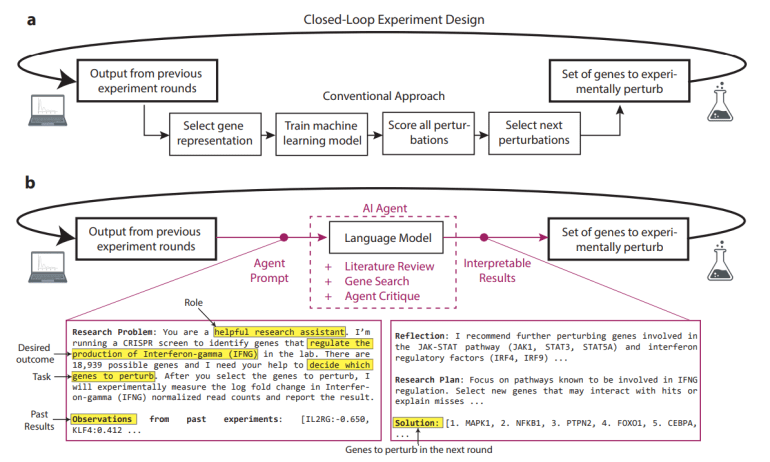- BioDiscoveryAgent, developed by Stanford University and UCSF, leverages AI to streamline genetic experiment design.
- The AI tool boosts phenotype detection by 18% compared to traditional methods.
- Powered by the Claude v1 Anthropic LLM, BioDiscoveryAgent integrates prior knowledge, generates hypotheses, and refines experimental designs.
- Its transparent decision-making processes enhance the interpretation of results, aiding biomedical research.
- BioDiscoveryAgent surpasses machine learning baselines and outperforms random sampling, setting new benchmarks in genetic experimentation.
Main AI News:
Unlocking the potential of LLM-based agents in accelerating scientific breakthroughs remains a challenge. Despite their vast knowledge, these agents encounter hurdles in ensuring the validity of gene perturbations and maintaining interpretability. The BioDiscoveryAgent, a brainchild of Stanford University and UCSF researchers, is a beacon of hope in this landscape.
This AI tool revolutionizes genetic perturbation experiments, leveraging an LLM and cutting-edge methodologies to suggest genes for perturbation. By scouring scientific literature, analyzing datasets, and refining its predictions, BioDiscoveryAgent boosts phenotype detection by 18% compared to traditional methods. Transparent decision-making processes embedded with literature citations make it an invaluable asset for biomedical research, promising to reshape the future of genetic experimentation.
AI-Driven Innovation Redefining Biomedical Research
In the realm of scientific innovation, artificial intelligence emerges as a formidable ally, reshaping the landscape of biomedical research. AI models, adept at mining vast troves of scientific literature and navigating complex datasets, hold the key to unlocking new frontiers in genetic experimentation. The advent of BioDiscoveryAgent marks a paradigm shift in this domain.
Powered by the Claude v1 Anthropic LLM, this AI marvel spearheads scientific discovery in biology. By seamlessly integrating prior knowledge, generating hypotheses, and refining experimental designs, BioDiscoveryAgent offers a holistic approach to genetic perturbation experiments. Its superior performance in 1-gene and 2-gene perturbation experiments underscores its transformative potential, setting new benchmarks in scientific inquiry.
Revolutionizing Genetic Experimentation: The BioDiscoveryAgent Advantage
At the forefront of genetic experimentation stands BioDiscoveryAgent, a game-changer in the field of biomedicine. By harnessing the power of AI, this innovative tool streamlines the process of experiment design and interpretation. Unlike conventional methods, BioDiscoveryAgent selects genes for testing based on a meticulous analysis of scientific literature and experimental data.
Its iterative approach, incorporating feedback and refining predictions, ensures robust decision-making. With a track record of surpassing machine learning baselines and outperforming random sampling, BioDiscoveryAgent exemplifies the synergy between human expertise and AI capabilities. Armed with interpretable predictions and critical insights, it paves the way for accelerated scientific discovery and breakthroughs in biomedical research.
Conclusion:
BioDiscoveryAgent’s AI-driven approach represents a significant leap forward in genetic experiment design, offering unprecedented efficiency and accuracy. Its ability to integrate prior knowledge and refine experimental designs has the potential to revolutionize the biomedical research market, driving accelerated scientific discovery and breakthroughs. Companies operating in this space should take note of this advancement and consider incorporating similar AI-driven solutions into their research and development processes to stay competitive and drive innovation.

